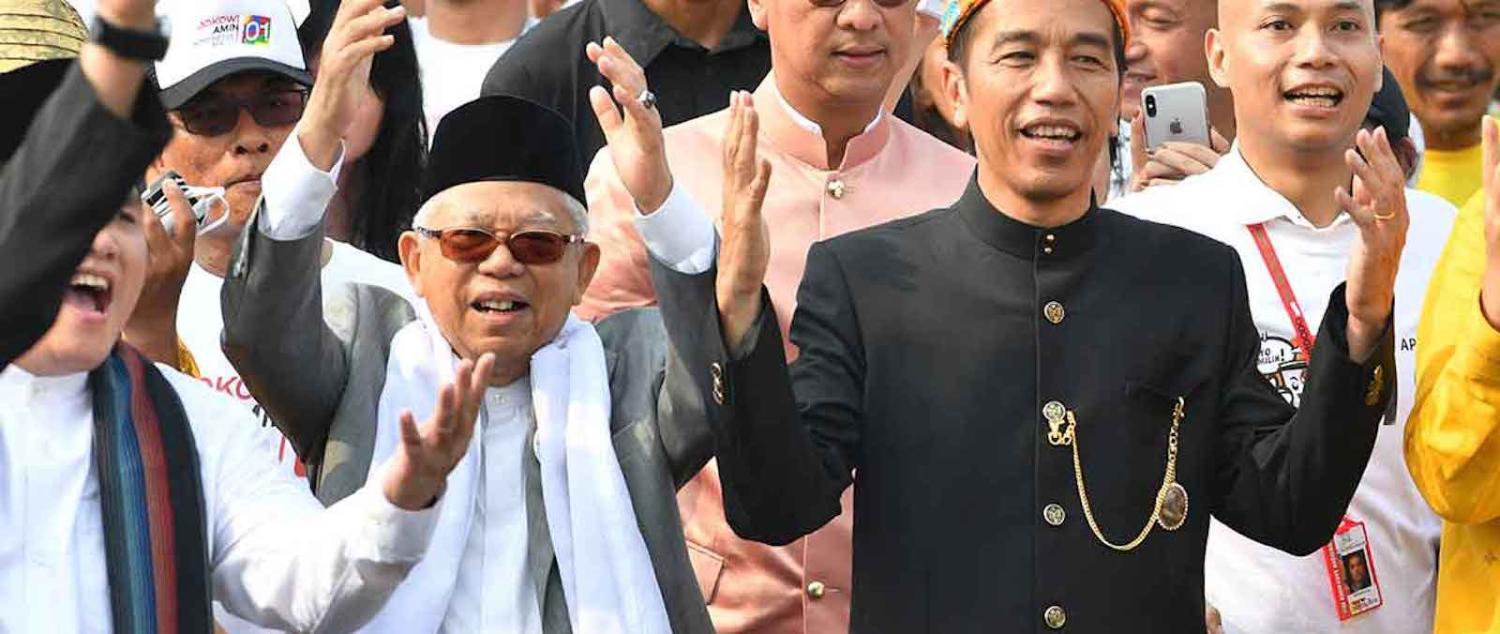Indonesian vice-presidential candidate Ma’ruf Amin has expressed regret for his role in testifying in the blasphemy case which saw former Jakarta governor Basuki Tjahaja Purnama (Ahok) convicted.
This statement touches on a number of themes and tensions we can expect to play out during the lead up to the election on 17 April.
Ma’ruf’s regret over his role in Ahok’s conviction is evidence of his forgiving nature as a person, but not a shift in his political and religious views.
President Joko (Jokowi) Widodo’s decision to choose Ma’ruf Amin as his running mate was widely speculated as a move designed to boost his Islamic credentials. Ma’ruf is one of the most influential Muslim figures in Indonesia, as chairman of the Indonesian Ulema Council (MUI), and having been supreme leader of Nahdlatul Ulama (NU) until his resignation to run for office.
As the chairman of MUI, Ma’ruf supported controversial edicts harmful to the rights of minorities, including women, LGBT people, and the Muslim minority group Ahmadiyyah. His prominent role in Ahok’s blasphemy trial only furthered his anti-human rights image. This meant that Jokowi’s decision to choose him as running mate upset Jokowi supporters concerned with human rights. It also did not appear to significantly improve Jokowi’s popularity, as had been hoped.
For some, Jokowi’s choice of Ma’ruf as running mate was seen as a shrewd political move to shield himself from the identity politics which had been so prominent in the 2016 Jakarta gubernatorial election, in order to ensure the election would centre on the economy. This was how Ma’ruf himself described his role.
It also prompted speculation about the inclusion-moderation thesis – the idea that including disruptive actors within democratic institutions will lead them to moderate their more extreme views and goals.
Is Ma’ruf expressing regret for his role in Ahok’s blasphemy case an example of the inclusion-moderation thesis in action?
On the one hand, it is not the first time Ma’ruf has expressed such sentiments. In September, he outlined his intentions to reconcile with Ahok. In October, he gave a keynote speech to the Rajaratnam School of International Studies (RSIS) in Singapore called “The Emergence of Wasatiyyah Islam: Promoting ‘Middle-Way’ Islam and Socio-Economic Equality in Indonesia”. Greta Nabbs-Keller has argued (see Indonesia’s elections: Jokowi-Ma’ruf appeal to middle ground) this is a sign that “Ma’ruf has reinvented himself as a proponent of moderate Islam”.
On the other hand, researcher Azis Anwar Fachrudin urges optimists to be cautious. He argues that Ma’ruf’s regret over his role in Ahok’s conviction is evidence of his forgiving nature as a person, but not a shift in his political and religious views. Other examples of moderation have also not demonstrated a definitive change in views, but merely a softening of tone to be more appealing to voters.
Two key events are coming up which will give us insight into the extent of Ma’ruf’s moderation, and the shape of things to come in the lead up to the election.
Thursday will see the first presidential debate, which is expected to focus on law, human rights, corruption, and terrorism. The debates will be important, considering 25% of voters remain undecided.
The other event is the release of Ahok from jail on January 24. Ahok has supported Jokowi’s decision to choose Ma’ruf as vice presidential candidate and even expressed a desire to participate the campaign once released. The public stance taken by Ahok upon his release, and Ma’ruf’s reaction to it, could have a significant impact on the election campaign.
The first major speech of the election campaign from Jokowi’s opponent Prabowo Subianto certainly indicates a desire to focus on economic issues, calling for a “people-centred economy.” However, whether the campaign can avoid the volatile identity politics of the Jakarta gubernatorial race and remain focused on the economy, the tensions between gaining the votes of conservative Muslim voters and progressive and minority voters, and the extent to which the inclusion-moderation thesis will prove to be valid, remains to be seen.
